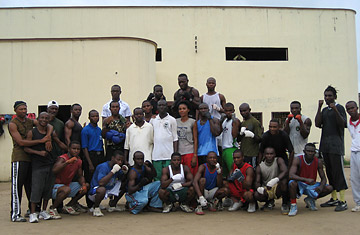
Local boys pose for a group photo in front of a gym with Coach Ade Young.
On a small patch of dirt, next to a shed lined with harvested cassava tubers, two young men circle each other with gloved fists raised, their frayed sneakers kicking up dust as they move in search of an opening. They punch wildly, sometimes hitting the opponent's face or body, more often hitting air and stumbling off balance. The crowd of young men leaning on their Chinese-made motorcycles doesn't seem to mind. Their whoops and jeers accompany every haymaker and uppercut thrown.
It may be thousands of miles, in every sense, from Caesar's Palace, Las Vegas, but this improvised open-air arena in a remote town in southeastern Nigeria is where current WBC world heavyweight champion Samuel Peter first honed his jab. But while Peter may have moved on to fame and fortune, his hometown gym still lacks a ring. Its aspiring fighters share head-guards, gloves, even gum-guards, and the coach who discovered Peter still plods along in obscurity, living in a tiny one-bedroom shack behind a palm-wine bar. Indeed, Coach Ade Young knows better than most just how little glamor is involved in boxing in Nigeria. A former national champion himself (1970 super lightweight), Young has spent decades traveling the countryside on the backs of trucks or on his motorcycle, recruiting the next generation of contenders.
On one such trip, 14 years ago, the trainer saw an adolescent Samuel Peter hitting a homemade punching bag at a local school. "I could see he had talent," Young says. "But he also was very hard-working. He said, 'Coach, I want to be a champion.' He would come to my house and talk about nothing but boxing." Peter soon became his most diligent, and eventually most successful, protégé.
Peter's uncle, Godwin Akpan Johnson, had reservations about his nephew's career choice. "As a family member when you saw him boxing you got disturbed," he says. "We wanted him to finish school, but God wanted him to be a boxer."
Peter fought his way up through local, regional and national tournaments, and finally to the 2000 Olympics in Sydney, where despite his quarterfinal loss, he attracted the attention of agents who began vying for his attention. Before long, the kid from Uyo was living in the United States and racking up an impressive record. In March, Peter earned $1.4 million when he beat Oleg Maskaev in Mexico City to claim the WBC heavyweight title. The fragmentation of the sport's governing bodies means such titles are rarely undisputed, but most rankings rate Peter as second only to Ukrainian Vitali Klitschko among the world's heavyweights.
Still, that's a stunning achievement for a young man from a country where the average person takes home less than $2 a day, and access to clean water and electricity are minimal. But his background may have forged both Peter's resilience and his drive to succeed. "You had to be tough at our school," remembers Abraham Nelson, a former classmate of Peter's. "In mechanics class, we dealt with heavy engines, and we would see who could carry the engines by themselves. We would also test the engine heat with our bare hands and say to each other, 'If you're strong put your hands in there.' Samuel would always do these things."
The hometown boy's boxing success has certainly stirred interest in the sport in his hometown. A recent evening finds at least two dozen aspirants eagerly gathered around Coach Young. He surveys the group, perhaps checking off their nicknames in his head: Spiritual, Empty Magazine, Horsepower, Supa, Uppa, Stockfish, My Baby. Then he blows a whistle and the training session is under way.
"Every day more and more boys are coming out," says Young says. "People believe that boxing is a way to gain. Because of Samuel Peter, people know this is another avenue to succeed in life." Most of the aspirants train in the mornings and evenings, then spend the days searching for menial odd jobs. Among the hopefuls is Mark Anthony Ennenim, 26, a wiry fighter whose long dreadlocks earned him the nickname Rasta. Ennenim sleeps on a thin prayer mat in a small hallway above the gym, where he's been training for two years.
"I used to get in a lot of fights as a kid. I had to find a way out, a way forward in life," he says. "It's difficult, but if you know what you want in the future it's worth the little sacrifices. If you don't pass through these tough things you won't appreciate it when you get to where you want to go. I haven't run away yet."
As soon as the last punch of the evening's sparring is thrown, the area in front of the gym empties out. The bystanders start their motorcycles and head off to Uyo's bars to drink potent beer and palm-wine. Women with bundles balanced on their heads walk past the edge of the ring, paying no attention to the sweat-soaked men. The boxers mingle around the gym, discussing that evening's fights. They don't leave; they have no place else to go.
